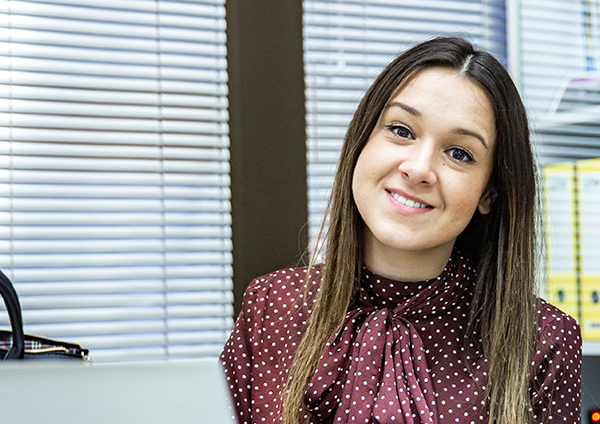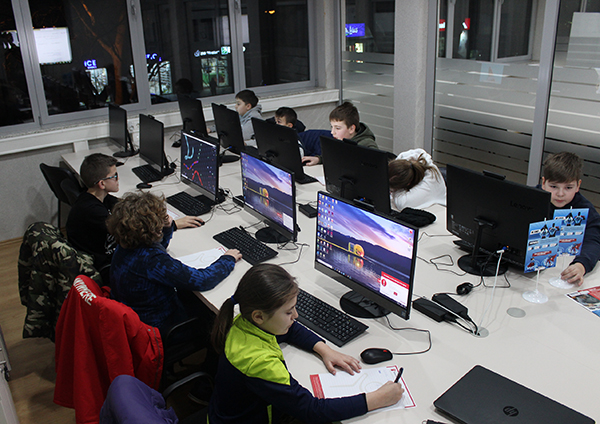 North West Balkans
North West Balkans
Languages
Lucija Zubac: Young people need support for the development in STEM disciplines in order to become tomorrow’s scientists, experts and engineers

Lucija Zubac from Mostar is a role model to young people, and especially to girls, in how they can achieve success in the field of science. This 28-year master in civil engineering is executive director of the Center for Technical Culture in Mostar, a place where hundreds of children and young people develop their talents and skills each year in the fields of science and art.
The work of the Center has been supported thorugh the USAID’s Enhancing and Advancing Basic Learning and Education in Bosnia and Herzegovina (ENABLE BiH) project.
The Center’s classrooms are currently empty due to the global coronavirus pandemic, but the Center has not stopped its activities. In the interview, Lucia reveals to us what activities the Center now offers, what its plans are, but also how she found herself in the world of science and art.
The current situation makes it impossible for you to work at the Center. Nonetheless, you offer certain content through the website and social networks. What is your current plan?
We can say that the whole world stopped for a moment because of the spread of the new coronavirus, and so did the schooling at the Mostar Center for Technical Culture (CTK), following the decision of the Crisis Control Unit.
The foundation of CTK’s schooling is interactive and fun learning through creative expression of practical skills. Due to the emergency situation, the children attending the CTK are unfortunately deprived of this type of schooling at the moment, in order to protect our loved ones.
Regular school classes are now held online, and both children and parents are overwhelmed by the educational content that is provided to them on a whole new level. Therefore, we did a little research among a group of students and their parents and found out that regular classes were more than sufficient to them in terms of compulsory learning at the moment. In order not to bombard children with various additional materials and educational contents, and striving to enable children to try interactive learning at home, we decided to collect and publish content based on learning through fun and play, but with materials that children have at home at this moment. This type of learning, of course, does not require any regular attendance, but is taking place in the form of extracurricular activity, and represents a break from compulsory learning, so that children’s days in the confined space of their homes pass faster, and without fear and panic.
On our web page, we created the section called STEAM Activities where we publish STEAM tasks, games, experiments, recipes, etc. In this way, children who are students of robotics may learn chemistry or those who take science workshop can engage in making different models, and through this principle of “casual“ work, some of the children may find their new hobby. In the coming period, there will be plenty of content, and if the situation persists, the CTK will prepare online workshops throughout the summer months when there are no school obligations.
Is it important for children to also continue non-formal education despite isolation and why?
Non-formal education is essential in life, which I have experienced myself. However, we have to keep in mind the current situation and the compulsory education that is happening online and is a completely new way of schooling for children and parents, which requires a lot of attention and effort with today’s pace of life. Therefore, we wanted to take a small break in non-formal education so as not to overwhelm the children. However, as time goes by, we see that everyone is getting used to distance learning, and since the school year is almost over and all formal teaching obligations of the children will cease, the CTK intends to develop online workshops and bring many more interesting things to children.
What are your plans for when the crisis is over?
The Center has planned a lot of plans and activities, as well as more STEAM opportunities in the coming period. CTK team is currently working on developing these plans so that activities can commence as soon as possible. We strive to keep up with world standards, with the demand for professions and practical skills, and open up opportunities to acquire them in the CTK. CTK plans to continue its regular activities as soon as this situation is over, which includes regular workshops, projects and the participation in fairs, open days for children and schools.
You mentioned earlier that some of your former students are now lecturers, founders of start-ups. Can you tell us about them?
Even as secondary school students, Luka Vučina and Marin Bevanda were students of the Center for Technical Culture, where they took an electronics course. Thanks to the course, they were encouraged to start their first project during their summer holidays when they began making their own speakers. This project did not see the light of day, but provided them with new knowledge/skills. After a few years, they started the Rubico project which resulted in the opening of the Amplius Company. Motivated by the fact that it was the CTK that prompted them to engage in projects, they returned to the Center and became lecturers to transfer their knowledge and experience to other children. Due to obligations at their company, they took a short break with lectures at the Center, during which time former students called and asked when they would be back and teach again because they were so enthusiastic about their lectures. After everything fell into place with the company, they very quickly returned and continued giving lectures.
Apart from Luka and Marin, CTK professors/lecturers worth mentioning are Tin Tadić and Lovro Vidović, active students of computer science, former CTK students, and now educators for upper elementary and secondary school students, which is a clear result of the development of children through these STEM Centers.

Why did you decide to pursue science and STEM fields?
Arts and natural sciences have been a love of mine from a young age, and due to the synergy of these interests I decided to study civil engineering already in elementary school. What I currently do and strive to do for children and young people at the CTK's STEM LAB, with the great support of the wonderful people who founded it, is actually something that I partly had in my childhood and that shaped me and led me down the path of engineering. However, at the time, I missed other opportunities that the Center today provides to children and young people. A lot is invested in sports academies, talents and other sports activities, which I certainly consider essential for maintaining health. But, as a total “anti-talent” for sport myself, I have wondered many times in my life: And, what am I going to do, where is my corner for developing ideas? Aware of the fact that sport does not make a living, that it is more or less a recreation for everyone, and that most of today's work is based on STEM disciplines, working through the Center emphasizes the importance of investing in science, i.e. in supporting young people in the development in STEM disciplines in order to become tomorrow’s scientists, experts and engineers. I would like to use this opportunity to support and encourage girls, and send a message that we women are very capable and, above all, gifted beings for science and engineering. My love for the arts, opportunities to engage in drama and creative activities while growing up, enjoying mathematics and physics through school and at home with the development of various experiments and solutions, my manual skills and other fine and practical skills have all grown over the years, on their own and due to various circumstances and opportunities, and resulted in an engineering degree in a branch that, in fact, is an integration of it all. Today's work in developing STEM opportunities for our society has come as a result of this engineering title and organizational skills from the younger days gained through demonstration and transfer of knowledge to college students, working with people, participating in various organizations and the student assembly as well as humanitarian work. I consider this only a good foundation on which I will continue to strive to build a better construction, which will benefit the society, with particular emphasis on creating opportunities for STEM sciences for children and young people, while specifically encouraging girls, as hopefully my future colleagues.
Do you have any role models among women in the world of science?
Marie Curie, a chemist and physicist who has discovered and researched radioactivity, has been my role model since childhood. She is certainly an example of smart, talented and very capable women in the natural sciences,. A role model of our time, as a scientist who lives and works among us, and especially while this pandemic lasts, for me is prof. dr. sc. Alemka Markotić, MD. Her work, expertise, calmness and contribution to science and human health are setting a real example.
Do you think it is especially important to encourage girls to become interested in the world of science?
Being in the engineering profession myself, I am aware of the problems that today's girls and women face. The number of female students during my studies was only about 30%. When I joined the CTK, I analyzed gender representation among its membership and the results did not surprise me, especially considering the environment we live in. The CTK predominantly engages in natural sciences, so the percentage was in favour of the male population: 70% boys, 30% girls.
Through various collaborations, and from the examples of my colleagues, I realized that a lot of women experienced being underestimated at work, either directly or indirectly, especially when it comes to engineering or natural sciences. However, working with all the wonderful women who have exceptional ideas, manage various projects, build their own trade/business, work in healthcare, etc., has certainly proven to me the ability of women to do well and handle multiple things and situations simultaneously. Therefore, it is necessary to encourage girls to engage in natural sciences, which the CTK certainly does. Women educators at the CTK are also an example. Women are created to always be able to do more and to be tireless. Thus, it is very important, especially in the environment we live in, to encourage girls from a young age to engage in natural sciences in order to become tomorrow's excellent scientists and socially responsible individuals.